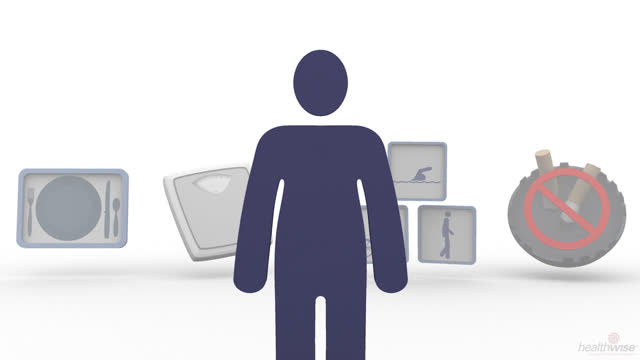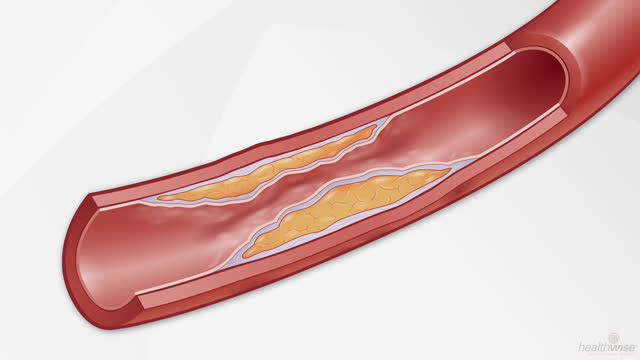Cholesterol Treatment Guidelines
Topic Overview
The goal in treating cholesterol is to lower your chance of having a heart attack or a stroke. The goal is not to lower your cholesterol numbers alone.
The following guidelines are from the American College of Cardiology and the American Heart Association.footnote 1
The two types of treatment are:
- Lifestyle changes.
- Medicines called statins.
The way you choose to lower your risk will depend on how high your risk for heart attack and stroke is. It will also depend on how you feel about taking medicines. Your doctor can help you know your risk. Your doctor can help you balance the benefits and risks of your treatment options.
Lifestyle changes
Lifestyle changes are always important, even if you take medicines to lower your risk.
Your doctor may suggest that you make one or more of the following changes:
- Eat heart-healthy foods.
- Lose weight if you need to, and stay at a healthy weight.
- Be active on most, if not all, days of the week.
- Don’t smoke.
Statins
You and your doctor can work together to understand your risks and what treatment is best for you. Your doctor may recommend that you take statins if the benefits outweigh the risks.
Statins strongly recommended for these people
Your doctor is likely to strongly recommend statins if you:
- Have heart disease.
- Have peripheral arterial disease.
- Had a heart attack.
- Had a stroke.
Statins recommended for these people
Your doctor is likely to recommend statins if:
- Your LDL cholesterol is 190 mg/dL or above.
- You have diabetes and you are age 40 to 75.
- Your 10-year risk of heart attack or stroke is 7.5% or above and you are age 40 to 75.
Statins not as clearly recommended for these people
For some people, it’s not as clear if they need to take a statin. You and your doctor will need to look at your overall health and any other risks you have for heart attack and stroke.
You and your doctor may think about these things in deciding about medicine:
- Your family history of early heart disease. Early heart disease means you have a male family member who was diagnosed before age 55 or a female family member who was diagnosed before age 65.
- A high LDL cholesterol test result (160 mg/dL or higher)
- Results of tests such as C-reactive protein, coronary calcium scan, or ankle-brachial index
- Your lifetime risk of heart attack and stroke
Other medicines
Your doctor may also talk to you about cholesterol absorption inhibitors or PCSK9-inhibitors. These medicines can also reduce the risk of heart attack and stroke for some people.
Other medicines can improve cholesterol levels, but they have not been proven to lower the risk of a heart attack or a stroke. Your doctor may recommend these medicines if there is a reason you can’t take a statin. These medicines include bile acid sequestrants, fibric acid derivatives, and nicotinic acid (niacin).
Health Tools
Health Tools help you make wise health decisions or take action to improve your health.
References
Citations
- Grundy SM, et al. (2018). 2018 AHA/ACC/AACVPR/AAPA/ABC/ACPM/ADA/AGS/APhA/ASPC/NLA/PCNA guideline on the management of blood cholesterol: A report of the American College of Cardiology/American Heart Association task force on clinical practice guidelines. Journal of the American College of Cardiology, published online November 8, 2018: S0735. DOI: 10.1016/j.jacc.2018.11.003. Accessed January 28, 2019.
Other Works Consulted
- Fleg JL, et al. (2013). Secondary prevention of atherosclerotic cardiovascular disease in older adults: A scientific statement from the American Heart Association. Circulation, published online October 28, 2013. DOI: 10.1161/01.cir.0000436752.99896.22. Accessed November 22, 2013.
- Goff DC Jr, et al. (2013). 2013 ACC/AHA guideline on the assessment of cardiovascular risk: A report of the American College of Cardiology/American Heart Association Task Force on Practice Guidelines. Circulation, published online November 12, 2013. DOI: 10.1161/01.cir.0000437741.48606.98. Accessed November 22, 2013.
Current as of: April 9, 2019
Author: Healthwise Staff
Medical Review:Kathleen Romito MD – Family Medicine & E. Gregory Thompson MD – Internal Medicine & Martin J. Gabica MD – Family Medicine & Adam Husney MD – Family Medicine & Adam Husney MD – Family Medicine
This information does not replace the advice of a doctor. Healthwise, Incorporated, disclaims any warranty or liability for your use of this information. Your use of this information means that you agree to the Terms of Use. Learn how we develop our content.





